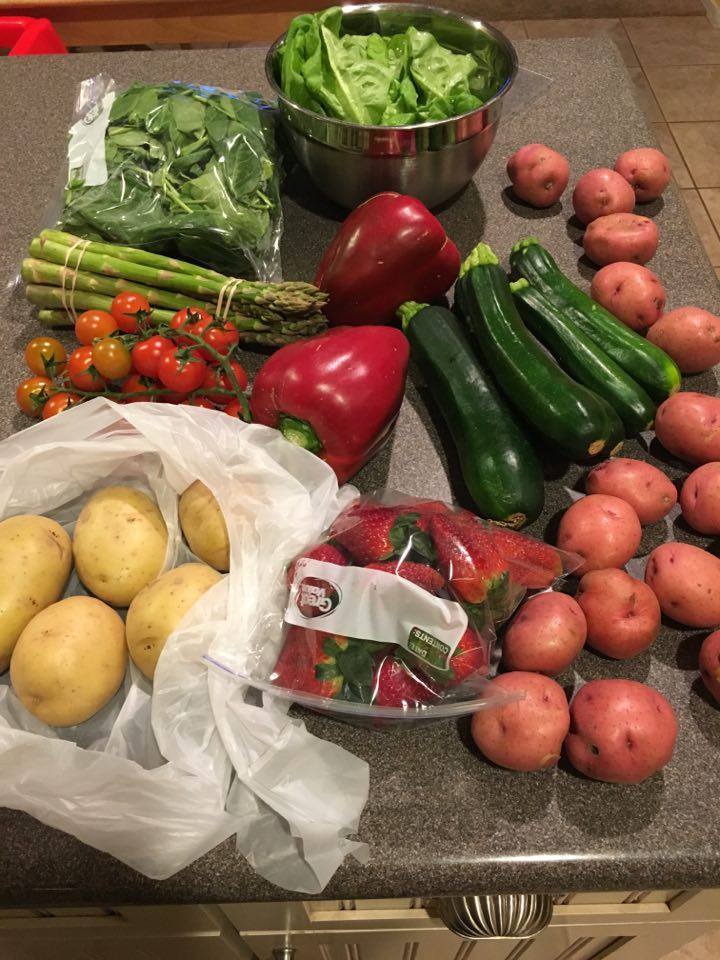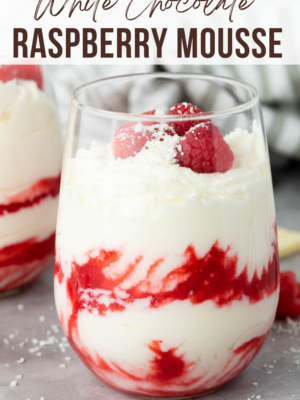
There is no question at all that I LOVE food. As much as I love it though, I don’t have a serious addiction or eating problem where I can’t control myself…
I do love to cook, I love to try new things and I adore GOOD food. Real food, whole food, gets me really excited. I recently read this on Organic Authority:
“Sixty years ago, Americans consumed virtually zero pounds of high fructose corn syrup, but that number today—more than 40 pounds per person (3,865 teaspoons per year or 11 teaspoons per day)—correlates with the high rise in Type II diabetes, obesity, heart disease and other diet-related illnesses. “
Exciting to read? Not so much!
There are some people that can go shop at the grocery store and come home with $200 worth of food for pennies. Sure, as excited as they are to save, it’s also a little worrisome too.

You know what gets me excited? Picking up a huge bag of freshly picked produce at the farm on a Thursday – I can’t wait to get home, and plow through that bag so I can start planning our meals for the week. That is truly exciting.
The last few years I have developed an infatuation for really GOOD food. I have learned what REAL food truly is and can do – and I have seen imposter food try to put themselves right up there with the real stuff… only to fail miserably.
If you would have asked me a few years ago for my thoughts on food, they would have been entirely different. But fast forward six years, and this lifestyle change has been one of intention.. not easy, difficult to adjust, but well worth the ride.
It hasn’t come without some negativity though. Let me tell you WHY it came out. Hopefully it will help you see the reason behind the shift.
Back in 2009, my husband was accepted to Warrant Officer Basic and Training Course – after almost 18 months of training, he deployed to Iraq with his unit. After being gone for a year, he returned with severe emotional distress in the form of anxiety attacks multiple times each day.
The VA Hospital was a resource, but not as great of a resource as one would hope; doctors placed him on multiple prescriptions .. which he relied on heavily over the next few years. Between this dependency on prescriptions and regular counseling, it was clear that he was not getting better but worse.. and he was looking at alternative methods for treating his anxiety.
At one point the doctor had him on almost 5 prescriptions … appointments were short, he was handed another Rx, and it was later filled. The prescriptions did more harm than good as they made him battle constant fatigue, he couldn’t eat without having digestive problems, and he was still highly tense, and unable to sleep at night. He couldn’t even drive home from work without feeling like he was going to fall asleep.
After taking it upon ourselves to do our OWN self study and after reading Michael Pollan’s book “In Defense of Food”, we adopted a different diet. We thought we were eating great – little did we know that the food was a huge factor in his gut health and overall well being. We ditched ALL processed food. Went Organic for over 80% of our purchases, and slowly removed him from each prescription over a long period of time. Was any of this recommended by the doctor?
The possibility of diet and lifestyle changes in relation to anxiety was not even remotely addressed by the doctor.
We sought out alternative wellness opportunities through heavy use of Essential Oils (you can read more HERE), fresh herbs, and real (whole) food. He tried, and tested a lot of things … learned how to curb his cravings, and disciplined himself to keep his health his #1 priority.
Fast forward to 2016, Dad is healthy, he has taken himself off prescription medicine, and treats his anxiety through real food, and Essential Oils. That’s huge – it was not an easy few years, in fact, it was a huge struggle for him, and I’m proud of him for making that commitment. Although he will still occasionally see a doctor for counseling, he has found comfort in other areas.
So why do I tell you this? Because over the last few years we have changed our outlook on self care – throughout this lengthy battle, we have learned a lot about what is truly FOOD.. and we have reinvented our relationship WITH food and self care in ways that many people may never have the opportunity to experience.
Some of you have seen this shift – and you like that. Some of you have expressed dissatisfaction with the shift in focus ON this site – and while we appreciate your thoughts, we {now} can see an entirely different side of the food and healthcare industry that you might not see.
9 Things We have Learned About Food
1. If it has more than 3 ingredients, then avoid it completely.
This is so easy to do, yet so HARD for some people. Before you buy, look at the ingredients. Chances are, if it has more than 3 ingredients, it’s stuff you really don’t need to pump into your system.
Industry has made it seem like we need a break – problem is, this “break” can run some pretty risky issues if you fall into the trap that has been set.
2. GMO’s are NOT an Optimal Choice
GMO stands for Genetically Modified Organisms – there are several types of GMO’s – you can see them below.
1. BT Toxin – it’s in Corn, Soy & Cotton. This is genetically engineered to reproduce. When bugs eat this BT Toxin their stomach will expand, and die.
2. Roundup Ready – the Plant has been genetically engineered to withstand roundup, and it does not die. Everything else around it WILL die – including the good bacteria. Within Roundup Ready is Glyphosate – which can destroy your gut bacteria. 70% of your immune system is your gut bacteria. Without that gut bacteria we can’t produce Tryptophan, without Tryptophan we can’t produce Seratonin. Without Serotonin we can’t regular blood sugar. Diabetes costs our Federal Government $245 Billion (that was as of 2012 – it may have increased since then). In my husband’s family almost everyone is diabetic. .. I have a multitude of friends that are also diabetic.
3. Desired Trait – Injected into items to wake up genes. Make lettuce more green, tomatoes bigger. The problem with these promoters, is that they have promoters – and many parents are concerned that these promoters are waking up our children in ways that aren’t good for their long term health. (Source)
GMO’s were introduced into the food supply in the mid 90’s by biotech companies – to increase crop herbicide and pesticide tolerance. Here in the U.S. the majority of our processed food has GMO ingredients: Corn, Soy, Canola, Cotton.
In other areas of the world, GMO’s are banned OR, they require labeling. Not here in the U.S. Are they good for you? We don’t think so – and you can read our last post to find out why.
3. Pasteurized Isn’t Pleasant
Pasteurization in the U.S. is designed to heat items to high temperatures to kill potentially dangerous germs. Unfortunately, when it kills those germs, it also kills the good bacteria and healthful properties in food. (ie. Milk, Honey, Baby Food, etc.)
Raw Honey is great for you – in it’s natural state it is full of vitamins & minerals. Unfortunately once heated it really lacks the same nutritional value. The same with milk – milk might be less than $2 per gallon in the grocery store, but once that milk is pasteurized, it’s processed – even if Organic, and lacks the same nutritional value.
Find a farmer in your area who sells Raw Milk – it’s a much better choice, full of vitamins, and the enzymes/bacteria your stomach needs. Most people that are unable to drink processed milk can drink Raw Milk just fine.
4. It’s easier than it looks
Switching to real food isn’t difficult at all. It might seem intimidating at first, and perhaps a little overwhelming, but it’s definitely not as hard as people think. Children are resilient and they adapt to anything. .. so if you are worried that they will struggle, they won’t. Mine didn’t.
5. We are not depriving our children
People may be quick to point out that you are depriving your children of having a little fun.. just one won’t hurt – and they might even think you are extreme. But honestly.. your choices are making a larger impact than you might think.
My 6 year old looks forward to having healthy food in his lunchbox, eats it all every day and is proud of what he has. My 9 year old will ask for a cucumber for lunch (in slices of course) … and 2 cups of pineapple before even remotely thinking of chips or bars.
5. Planning is Required
If you aren’t planning ahead for your next meal, then you are falling short. Or will fall short. Not a day goes by that I’m not planning for our ext few meals. Always think through what you need to have on hand, what the next meal will be – ensure you are prepared with these healthy pantry staples, and always have the Instant Pot ready so you can put it to work to whip up something in a hurry.
If not, you’ll find yourself eating poor food choices at the drive through.
No matter if your children have sports or extracurricular, there is ALWAYS a way to plan around that – especially when there are appliances out there that can cook in your absence when you are out of the house – and keep it warm until you return.
6. Eating Real {Organic} Food is NOT Expensive
What’s expensive is looking at the stuff for sale in stores that is FAR from real. I have noticed that this is always a reason people have as to not eating better.. but in reality, it’s relatively inexpensive because you aren’t buying all the packaged food. Produce is our focus, and although milk is much higher per gallon it’s well worth every penny.
Knowing WHERE to get your items is essential. Looking beyond the grocery store is important, CSA’s and Farmers Markets are incredibly important as is growing your own produce at home.
7. Looking Beyond the Grocery Store is Essential
The grocery store isn’t actually in your best interest. The weekly grocery ads might have an occassional deal but overall, most items for sale are those that drive people in the store. Healthy items don’t motivate people as much as cheap pizza, cookies, and packaged food. Staying away from the grocery store, and learning how to be self sufficient by growing your own produce, picking up meat direct from a Farmer, and learning how to make things yourself are far greater than running into a store and filling your cart with unhealthy items.
8. Your Choices Will be Ridiculed and often times Misunderstood
In a nation of political correctness, sharing your story about what prompted you to change your eating habits will not (for the most part) be appreciated by most.
As a country we should not be promoting subsidies on poor food; we should not be pumping animals full of hormones that destroy the food’s natural goodness. We should not be adding additives, dyes, extra sugar and fats. Instead, we should be educating others on how to serve whole foods and make better choices. Eating better is not any more expensive than eating poor, it’s a personal choice and being aware.
But that will probably not happen in the foreseeable future because poor food choices lead to ill health, which leads to more medical care, prescriptions and doctor visits. And since those are all profitable businesses, then they will continue to dictate what corporations do, and people will make that choice purely based on lack of knowledge, and convenience.
9. Real Food has more Taste
We can’t (and don’t) eat perfectly 100% of the time, but we have avoided fast food for the last year, if not more. We never went much to begin with, but we intentionally avoid it altogether now.
People think that we just have to avoid it at this point, but the truth is . not only do we HAVE to avoid it, we want to avoid it. David’s diet changed so drastically it was easier for us to change the entire family diet than accommodat one person. His gut health is better. His anxiety has decreased dramastically. Eating poor food destroys his gut, and therefore causes him more harm than good
And quite honestly it just doesn’t taste good to us at this point in time. The more we eat at home, the more we avoid fast food and restaurants, the more we appreciate our own home cooked food. The same goes for convenience foods – crackers, fish crackers, kids cereal, fruit snacks… the kids don’t ask for them and quite honestly at this point I don’t even think they miss having them.
It’s easy to avoid eating them when you can quit buying them in their entirety.
Eating better has worked wonderfully for us. We are sharing that experience in hopes that it will help those who might be inspired to make that shift.



